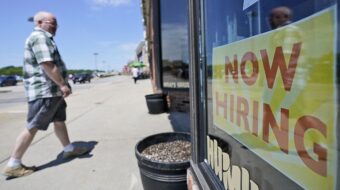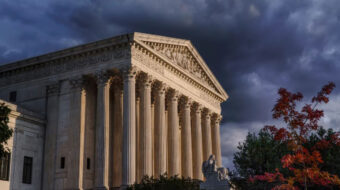News Analysis
On April 21 in Geneva, Switzerland, the UN Human Rights Commission (HRC) rejected a watered-down Cuban resolution asking the United States to let an HRC team check on the widely reported mistreatment of U.S. prisoners at Guantanamo Bay.
The vote was 22 votes against the resolution, 8 in favor, with 23 abstentions. European Union nations voted as a bloc against the resolution. Ironically, the European Parliament had only recently demanded a similar investigation. The Dutch ambassador, speaking for the EU, suggested such a resolution was unnecessary because the UN is seeking Washington’s permission to send investigators to Guantanamo. That request has gone unanswered for 16 months.
The week before, with EU support, the HRC narrowly passed a U.S.-sponsored resolution calling for UN monitoring of alleged Cuban human rights abuses. That’s how Washington characterizes Cuba’s jailing in April 2003 of paid foreign agents engaged in anti-government activities. According to Felipe Perez Roque, Cuba’s foreign minister, the U.S. government pushes such resolutions each year to secure diplomatic cover for its economic blockade of the island.
The caving-in by the EU to Washington’s strong-arm lobbying on these resolutions prompted Perez Roque to characterize the Europeans as “capitulating, servile and hypocritical.”
Meanwhile, this month’s arrival of Luis Posada Carriles in Miami has brought into focus the two-faced nature of the U.S. war on terrorism.
Posada is an admitted terrorist. He reportedly bombed a Cubana airliner in 1976 killing 73 people and engineered Havana hotel bombings in 1997, killing an Italian tourist. In 2000, he and three others were caught in Panama before they could kill a visiting Fidel Castro.
The 77-year-old terrorist now is safe in Miami. Posada’s lawyer filed an application April 12 for asylum in the U.S. on the grounds of his past CIA services. On April 11, Rep. William Delahunt (D-Mass.) asked the House International Relations Committee to investigate Posada’s entry into the country as “a dangerous failure to secure our borders. … The fundamental credibility of the war on terrorism hangs in the balance.”
Fidel Castro has demanded that Posada be tried by an international court or be extradited, as requested, to Venezuela, where he is a citizen. In 1985, Posada escaped from jail there during the appeals process for his trial on terrorism charges. On April 20 the National Lawyers Guild also called for Posada’s immediate extradition.
Commenting on Posada’s arrival, Eugene Robinson wrote in the Washington Post, “An accused mass-murdering terrorist has sneaked into the United States illegally and is skulking around. … You’d expect the Bush administration to ramp up to Threat Level Red. … But, no, it turns out that this is the drill only when the suspect’s name is Mohammed. When his name is Luis Posada Carriles, and he’s Cuban, and his alleged terrorist career was aimed at toppling or killing Fidel Castro, the procedure is different.”

MOST POPULAR TODAY


Zionist organizations leading campaign to stop ceasefire resolutions in D.C. area

High Court essentially bans demonstrations, freedom of assembly in Deep South

Communist Karol Cariola elected president of Chile’s legislature

Afghanistan’s socialist years: The promising future killed off by U.S. imperialism





Comments